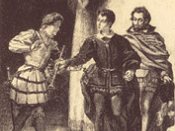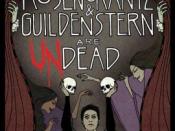Only too often we find ourselves watching a movie, reading a book or listening to a song that has an element of something else consistent in it. Whether the original meaning is the same or it having being altered to the times and the changes society faces, the end result and the basic meaning behind it is shaped from a time in society when the values and themes of reality were in complete contrast to the themes of today. Nowadays these themes are juxtaposed to create texts that have a new meaning and purpose within themselves. A prime example of this would be the distinguishable components of Hamlet in Rosencrantz and Guildenstern are Dead.
Ladies and gentlemen of the HSC board of examiners my name is Trisha LaBonte from Polly Fector High School and I've been asked to discuss with you the transformation of texts in contemporary society primarily relating to Hamlet by William Shakespeare and Rosencrantz and Guildenstern are Dead by Tom Stoppard. Both composers have been influenced by the times in which their ideals lie and have presented themes and values of relevance to this. The transformations of the original themes in Hamlet of death and fate and the language medium used to form this tragedy are apparent in Rosencrantz and Guildenstern are Dead. However the themes in Rosencrantz and Guildenstern are Dead are combined for comedic purposes, giving personalities to both Rosencrantz and Guildenstern, used modern allusions and the nature of theatre.
The concept of transforming a text of a serious nature into one that has comedic characteristics is not a new device in literature. This is done in society these days to distribute a new meaning to the audience, very often a different opinion or judgement. Transformations in texts are used to say...


